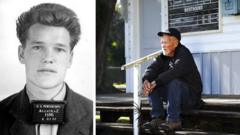93-year-old Charlie Hopkins, who spent three years in Alcatraz in the 1950s, reflects on his time in the notorious prison amidst President Trump's recent proposal to reopen it for federal use. He describes the isolation, difficulty, and notorious inmates he encountered while expressing skepticism about the feasibility of Trump's plans.**
**Former Alcatraz Inmate Weighs in on Trump's Reopening Proposal**

**Former Alcatraz Inmate Weighs in on Trump's Reopening Proposal**
**Charlie Hopkins, the possible last surviving inmate of Alcatraz, shares insights on life behind bars and the feasibility of reopening the infamous prison.**
Charlie Hopkins, once a resident of Alcatraz, has recently shared his thoughts on President Donald Trump's proposal to reopen the infamous prison, which closed its doors over 50 years ago. At 93, and likely the last living former inmate of the notorious facility, Hopkins has moved back to Florida, where he reflects on the loneliness he experienced during his three years on the isolated island.
Hopkins was sentenced to 17 years for kidnapping and robbery, arriving at the prison in 1955 after transferring from another institution. He recalls the stark silence, punctuated only by the distant sound of ships. "That's a lonely sound," he said, reminiscent of Hank Williams' lyrics, capturing his sense of isolation.
The former inmate claims that the San Francisco National Archives has informed him of his unique status, although the BBC has yet to verify this information. In recent interviews, he recounted life inside Alcatraz, where he mingled with notorious criminals. He even played a role in planning a failed escape attempt. Trump’s comments about potentially reopening the prison to house "the country’s most ruthless and violent offenders" were surprising to Hopkins, who remembers the facility's dilapidated state.
In his recollections, Hopkins described Alcatraz as clean but lacking in comfort. With limited options for entertainment, he filled his time sweeping the floors and maintaining the prison. He faced challenges, resulting in time spent in solitary confinement—his longest visit there being six months due to his involvement in an escape plan with fellow inmates, including notorious bank robber Forrest Tucker.
Alcatraz was home to famous criminals, like Al Capone and James Bulger, and endured numerous escape attempts, including a particularly famous one in 1962 that remains a subject of intrigue. Yet, despite the notorious past, Hopkins expresses disbelief about the practicality of Trump's plan, emphasizing the enormous expense involved in refurbishing the decrepit structures and modernizing the facilities.
Hopkins stresses that restoring Alcatraz would be financially burdensome, mentioning that basic sanitation systems were outdated and poorly managed. He also has doubts about the sincerity of Trump’s intentions, suggesting it was more a public relations move than a serious proposal.
Since his release in 1963, Hopkins has sought to rebuild his life, fancying himself an author after penning a detailed 1,000-page memoir on his life experiences, including his time in Alcatraz. Now with a family in Florida, he embraces his past with introspection, recognizing his former troubled behavior and expressing remorse for his actions.
As discussions about Alcatraz's future circulate, the echoes of its storied past continue to resonate, leaving many curious about the fate of this symbolic landmark.






















